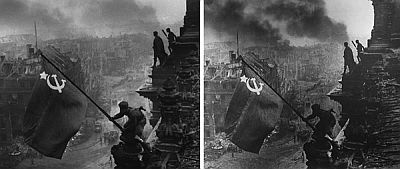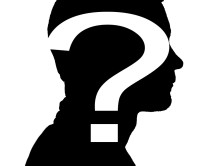
On the left, see the original - and staged - photo of the Reichstag. The version on the right is the manipulated version of the staged version. (Credit: FamousPictures.org)
A Soviet World War II photo inspired by the famous Iwo Jima flag raising image was both manipulated and staged, bloggers write.
“Symbolizing Soviet victory and revenge; not only did [the photographer] immortalize the moment: he created it,” Dean Lucas wrote on FamousPictures.org about the photo, called the Reichstag photo.
Lucas wrote that Soviet war photographer Yevgeny Khaldei was “on the front lines” with the Russian army and wanted to take a picture similar to the famed Iwo Jima image. Iconic Photos blog posted Nov. 9, 2009 that Khaldei was “the premier” Russian army war photographer from 1939 to 1948.
But, in order to do that, Khaldei had to set the scene up. “Celebrated as the image is, it was a reconstruction of a moment that had happened earlier but had been missed by the cameras,” Lucas wrote.
He and his uncle sewed their own Soviet flag out of tablecloths because Khaldei didn’t have one. And, after staging the photo, Khaldei edited the image to add in clouds and smoke, to remove a second watch from the soldier’s wrist, the New York Times reports.
Michael Sontheimer wrote July 5, 2008 that that the photo was manipulated to put in a “new flag, billowing dramatically in the wind.”
“The photo represented a historic moment, the defeat of Germany in a war that cost the Soviet Union tens of millions of lives,” and was first published May 13, 1945 in Ogonyok magazine, Lucas wrote.
The New York Times wrote in October 1997 on Khaldei’s death at 80. The Times reported that the Reichstag photo “was reproduced on magazines around the world, and became a staple of Soviet postage stamps and commemorative postcards” noting that the photo was “enhanced” but not that it was staged.
“In his heroic Soviet propaganda style he is probably the only journalist to arrange, choreograph and then capture such a symbolic event. He defended posing most of his pictures by insisting that the shot taken should match the importance of the event,” Lucas wrote.
The Associated Press called the Iwo Jima shot, taken by Joe Rosenthal, “the most memorable photograph of World War II.”
The AP wrote April 27 that there had been speculation that Rosenthal’s photo was staged because it’s “too perfect.” Time magazine had reported that Rosenthal had staged the photo, but then retracted its story and apologized to Rosenthal.
The New York Times reported June 26, 2007, that Rosenthal maintained that he didn’t stage the photo and that his picture was of the second flag raising.
Museum of Hoaxes wrote the Reichstag and Iwo Jima photos are probably the “most famous” photos from World War II.
iMediaEthics wrote June 5 when the Irish Film Institute discovered a famous war photo was actually a movie still, and not a news photo.




